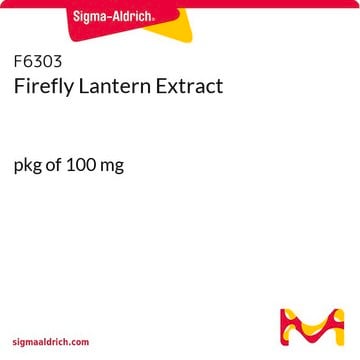FLE250
Firefly Lantern Extract
for ATP determination
Synonym(s):
FLE
Sign Into View Organizational & Contract Pricing
All Photos(1)
About This Item
UNSPSC Code:
12352202
NACRES:
NA.81
Recommended Products
Quality Level
form
solution
packaging
pkg of 250 mg dried lanterns
technique(s)
toxicology assay: suitable
storage temp.
−20°C
General description
The bioluminescent organism, Photinus pyralis firefly is the source of firefly lantern extract. The luciferase enzyme is 60 kDa enzyme which lacks prosthetic group and bound metal in its structure. The N-terminal harbors residues crucial for the bioluminescent activity and the C-terminal possess peroxisome targeting motif.
Application
Fireflies have been used in several studies of bioluminescence. In particular they may be used in assays to determine toxicity pathways because bioluminescence can quantitatively measure a wide range of biological activities.
Firefly Lantern Extract has been used in the detection of ATP concentrations by bioluminescence flash analysis in seawater samples, bioluminescence assay in river sediments samples, marine sediments and in quantifying extracellular ATP in red blood cells.
Biochem/physiol Actions
Firefly Lantern Extract containing luciferase catalyzes oxidative decarboxylation of luciferin (LH2) in the presence of ATP, oxygen and Mg2+ to yield a light-emitter oxyluciferin.
Other Notes
Crude luciferin and luciferase
Reconstitution
After reconstitution with 25 mL of water, vial will contain 0.06 M potassium phosphate, pH 7.4, and 0.02 M MgSO4.
Storage Class Code
11 - Combustible Solids
WGK
WGK 3
Flash Point(F)
Not applicable
Flash Point(C)
Not applicable
Certificates of Analysis (COA)
Search for Certificates of Analysis (COA) by entering the products Lot/Batch Number. Lot and Batch Numbers can be found on a product’s label following the words ‘Lot’ or ‘Batch’.
Already Own This Product?
Find documentation for the products that you have recently purchased in the Document Library.
Oxyluciferin, a luminescence product of firefly luciferase, is enzymatically regenerated into luciferin
Gomi K and Kajiyama N
The Journal of Biological Chemistry, 276(39), 36508-36513 (2001)
Firefly bioluminescence: a mechanistic approach of luciferase catalyzed reactions
Marques SM, et al.
IUBMB Life, 61(1), 6-17 (2009)
Prameet Kaur et al.
Bio-protocol, 10(23), e3856-e3856 (2021-03-05)
Alzheimer's Disease (AD) has long been associated with accumulation of extracellular amyloid plaques (Aβ) originating from the Amyloid Precursor Protein. Plaques have, however, been discovered in healthy individuals and not all AD brains show plaques, suggesting that extracellular Aβ aggregates
Involvement of acetylcholinesterase and protein kinase C in the protective effect of caffeine against beta-amyloid-induced alterations in red blood cells
Carelli-Alinovi C, et al.
Biochimie, 121, 52-59 (2016)
Concentrations and uptake of dissolved organic phosphorus compounds in the Baltic Sea
Nausch M, et al.
Frontiers in Marine Science, 5(386) (2018)
Our team of scientists has experience in all areas of research including Life Science, Material Science, Chemical Synthesis, Chromatography, Analytical and many others.
Contact Technical Service







